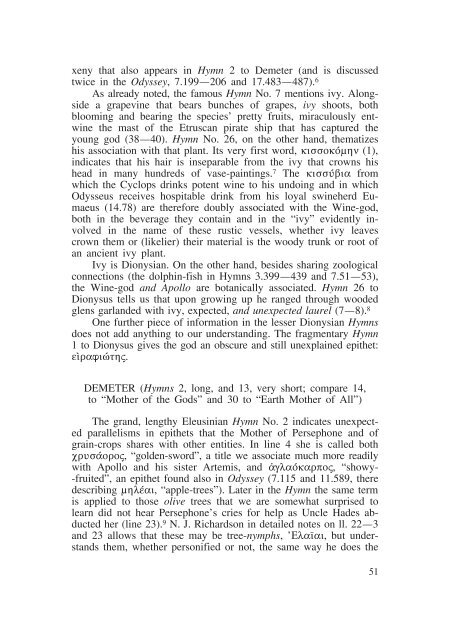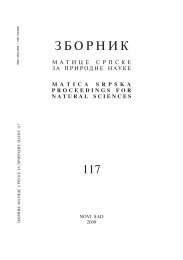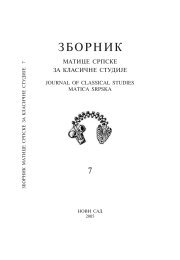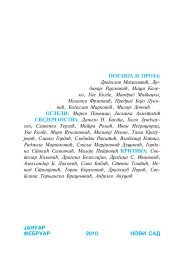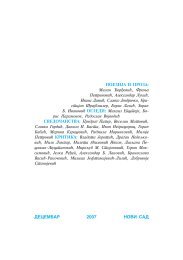Create successful ePaper yourself
Turn your PDF publications into a flip-book with our unique Google optimized e-Paper software.
xeny that also appears in Hymn 2 to Demeter (and is discussed<br />
twice in the Odyssey, 7.199—206 and 17.483—487). 6<br />
As already noted, the famous Hymn No. 7 mentions ivy. Alongside<br />
a grapevine that bears bunches of grapes, ivy shoots, both<br />
blooming and bearing the species' pretty fruits, miraculously entwine<br />
the mast of the Etruscan pirate ship that has captured the<br />
young god (38—40). Hymn No. 26, on the other hand, thematizes<br />
his association with that plant. Its very first word, kissokÃmhn (1),<br />
indicates that his hair is inseparable from the ivy that crowns his<br />
head in many hundreds of vase-paintings. 7 The kissÿbia from<br />
which the Cyclops drinks potent wine to his undoing and in which<br />
Odysseus receives hospitable drink from his loyal swineherd Eumaeus<br />
(14.78) are therefore doubly associated with the Wine-god,<br />
both in the beverage they contain and in the “ivy" evidently involved<br />
in the name of these rustic vessels, whether ivy leaves<br />
crown them or (likelier) their material is the woody trunk or root of<br />
an ancient ivy plant.<br />
Ivy is Dionysian. On the other hand, besides sharing zoological<br />
connections (the dolphin-fish in Hymns 3.399—439 and 7.51—53),<br />
the Wine-god and Apollo are botanically associated. Hymn 26 to<br />
Dionysus tells us that upon growing up he ranged through wooded<br />
glens garlanded with ivy, expected, and unexpected laurel (7—8). 8<br />
One further piece of information in the lesser Dionysian Hymns<br />
does not add anything to our understanding. The fragmentary Hymn<br />
1 to Dionysus gives the god an obscure and still unexplained epithet:<br />
eÆraci3thj.<br />
DEMETER (Hymns 2, long, and 13, very short; compare 14,<br />
to “Mother of the Gods" and 30 to “Earth Mother of All")<br />
The grand, lengthy Eleusinian Hymn No. 2 indicates unexpected<br />
parallelisms in epithets that the Mother of Persephone and of<br />
grain-crops shares with other entities. In line 4 she is called both<br />
xrysÀoroj, “golden-sword", a title we associate much more readily<br />
with Apollo and his sister Artemis, and ÈglaÃkarpoj, “showy-<br />
-fruited", an epithet found also in Odyssey (7.115 and 11.589, there<br />
describing mhlçai, “apple-trees"). Later in the Hymn the same term<br />
is applied to those olive trees that we are somewhat surprised to<br />
learn did not hear Persephone's cries for help as Uncle Hades abducted<br />
her (line 23). 9 N. J. Richardson in detailed notes on ll. 22—3<br />
and 23 allows that these may be tree-nymphs, 'Elaìai, but understands<br />
them, whether personified or not, the same way he does the<br />
51


